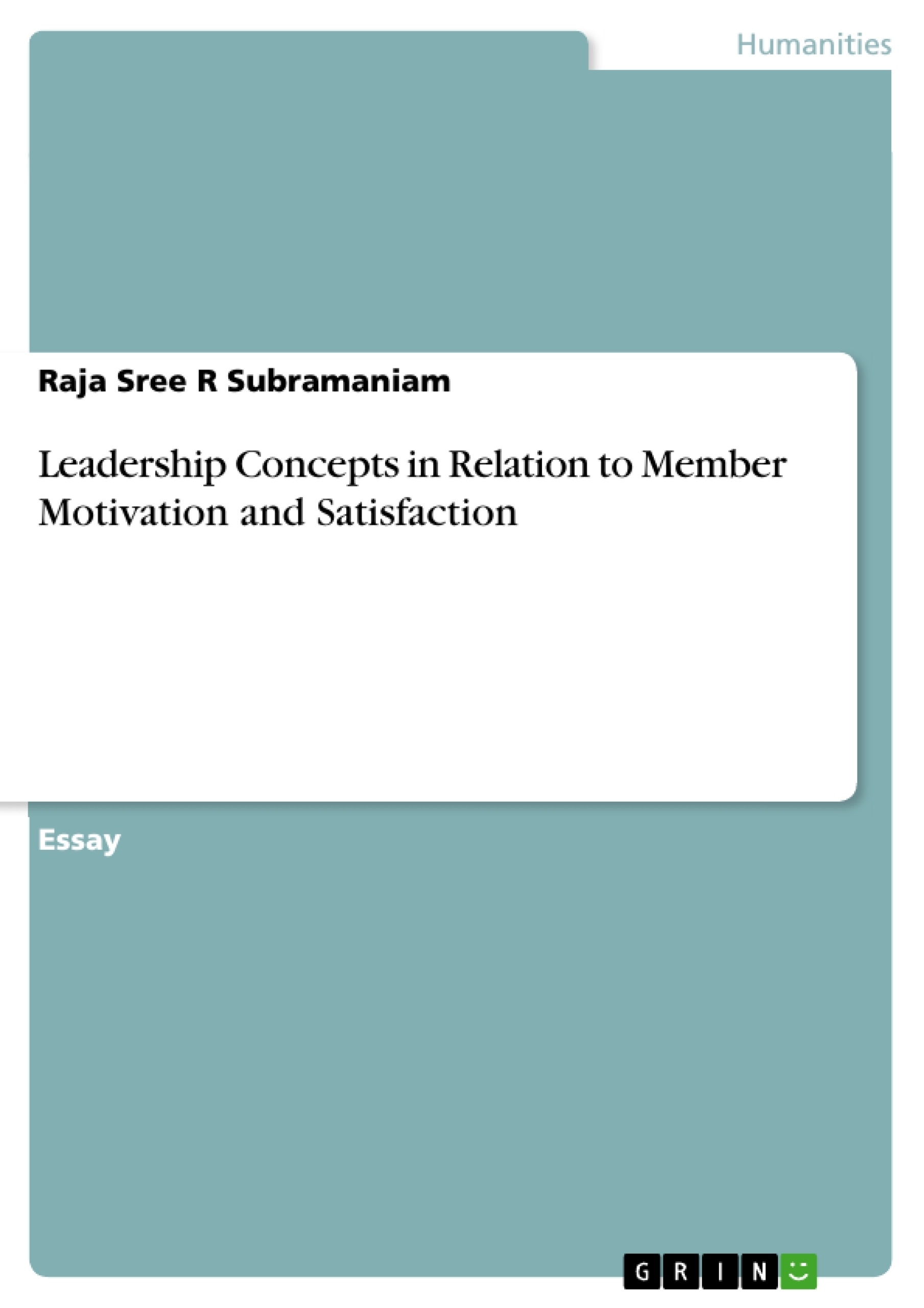This essay aims to discuss effects of various leadership approaches on member motivation and satisfaction. Leadership is a social influence phenomenon which functions to persuade, motivate and unite members in a group towards achieving shared objectives (House et al., 2002). Research has shown that there is a positive relationship between a leadership style and the ability to influence others’ psychological state. (Keltner, Gruenfeld & Anderson, 2003). That is, higher productivity and greater satisfaction are recorded when members’ needs are understood and satisfied (House, 1996, p.340).
The issue of whether leaders should strictly be a goal oriented or people oriented to have been the subject of much research. Both sides of the debate defend each concept as more effective than the other, but these findings do not resolve the issue. Instead, it can be argued that other equally important factors such as leader and follower characteristics, task structure, gender roles, cross- cultural differences and various other situational demands have an impact on leadership approach. Effective leaders place importance in identifying distinctive qualities of individuals in a group and are ever willing to provide motivation and support towards achieving a common goal (House et al., 2002). Consequently, greater cooperation, understanding and support of decision are achieved.
Inhaltsverzeichnis (Table of Contents)
- Leadership: An Overview
- Trait Theories of Leadership
- Behavioural Theories of Leadership
- Contingency Theories of Leadership
- Motivational Theories of Leadership
- Service Oriented and Transformational Leadership
Zielsetzung und Themenschwerpunkte (Objectives and Key Themes)
This essay aims to discuss the effects of various leadership approaches on member motivation and satisfaction. The essay explores the evolution of leadership theories from early trait theories to modern-day transformational leadership, analyzing the strengths and limitations of each approach.
- The impact of leadership style on member motivation and satisfaction.
- The evolution of leadership theories from trait to transformational perspectives.
- The influence of situational factors, member characteristics, and leader traits on leadership effectiveness.
- The importance of understanding and matching leadership approaches to specific contexts.
- The role of empowerment, motivation, and shared goals in fostering effective leadership.
Zusammenfassung der Kapitel (Chapter Summaries)
- Leadership: An Overview: This introductory chapter defines leadership as a social influence phenomenon, highlighting its crucial role in persuading, motivating, and uniting group members to achieve shared objectives. The chapter also introduces the ongoing debate surrounding goal-oriented versus people-oriented leadership, emphasizing the importance of situational factors and individual characteristics in determining effective leadership styles.
- Trait Theories of Leadership: This chapter delves into the early theories that focused on identifying innate traits or qualities associated with effective leaders. It examines the assumptions of "born leaders" and the role of personality and intelligence in leadership effectiveness. The chapter also discusses research findings on social stereotyping and the potential influence of power dynamics on leadership perceptions.
- Behavioural Theories of Leadership: This chapter shifts focus to the behavioral perspective of leadership, exploring McGregor's Theory X and Theory Y. It examines how leaders can balance organizational goals with the needs of workers by understanding different types of human nature and tailoring their approach accordingly. The chapter also discusses the limitations of McGregor's theory in addressing factors such as gender roles and cross-cultural influences.
- Contingency Theories of Leadership: This chapter explores the concept of leadership effectiveness being contingent upon specific situational factors. It presents Fiedler's contingency model and Tannenbaum and Schmidt's leadership continuum, both of which emphasize the interplay between task structure, leader-member interaction, and the continuum of authority in determining effective leadership styles. The chapter also discusses the importance of matching leadership approaches to member experience levels and task complexity.
- Motivational Theories of Leadership: This chapter examines how motivational approaches, such as transactional leadership, can be used to incentivize followers and foster commitment. It explores the concept of exchanging rewards for trust and commitment and discusses the strengths and limitations of transactional leadership in different contexts. The chapter also highlights the importance of aligning rewards and goals with the specific needs and motivations of followers.
Schlüsselwörter (Keywords)
This essay focuses on leadership styles, member motivation, and satisfaction. Key concepts include trait theories, behavioral theories, contingency theories, motivational theories, service-oriented leadership, transformational leadership, empowerment, situational factors, member characteristics, task structure, and leadership effectiveness.
Frequently Asked Questions
How does leadership style impact member motivation?
Leadership is a social influence phenomenon. Research shows that higher productivity and satisfaction occur when a leader understands and satisfies the psychological needs of the group members.
What is the difference between goal-oriented and people-oriented leadership?
Goal-oriented leaders focus on achieving objectives and task completion, while people-oriented leaders prioritize the well-being, support, and development of their team members. Effective leaders often balance both based on the situation.
What are McGregor's Theory X and Theory Y?
Theory X assumes workers are inherently lazy and need strict control. Theory Y assumes employees are self-motivated and thrive under empowerment and responsibility. Leadership behavior often follows these underlying assumptions.
What is transformational leadership?
Transformational leadership focuses on inspiring and motivating followers to exceed expectations by creating a shared vision and fostering an environment of trust and innovation.
How do situational factors affect leadership effectiveness?
Contingency theories suggest that no single style is best. Factors like task structure, member experience, and cultural differences determine which leadership approach will be most successful in a given context.
- Quote paper
- Raja Sree R Subramaniam (Author), 2011, Leadership Concepts in Relation to Member Motivation and Satisfaction, Munich, GRIN Verlag, https://www.grin.com/document/313658



